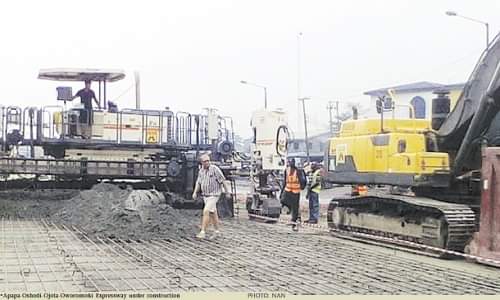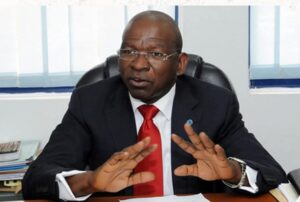The deal between the Federal Government and private firms to fix collapsed highways raises hope of a superb road networks across the country, writes ROBERT EGBE.
For years, Nigeria has been beset by a surfeit of failed infrastructural projects, especially roads. All over the country, all you see are roads and highways that are failing or have totally collapsed. Many roads that have been constructed ages ago have been left unattended over the years. Not a few have totally crumbled and have become impassable. Popular road like the Enugu-Onitsha Highway, Apapa-Oshodi Expressway, Lagos-Ibadan Expressway, Minna-Suleja Expressway, among scores of others, were abandoned for years. Subsequent pledges by the Federal Government and efforts to rehabilitate or reconstruct them yielded little results.
Several reasons have been adduced for the road problems in Nigeria. Besides the long years of neglect and a total lack of a good maintenance culture, there was a sudden explosion of vehicles on Nigerian roads. For instance, in 1983, there were just about 150, 000 vehicles in the country. But as the population grew, and with the influx of imported second-hand vehicles into the country, the figure rose rapidly. Right now, there are well over 11 million vehicles plying Nigerian roads.
Governments, at all levels, have always fingered the unavailability of funds as the main reason for the pathetic state of roads in the country. Indeed, federal budgetary allocations to roads have been abysmally low and pathetic. In 2018, the Federal Government budgeted about N138.8 billion for construction and rehabilitation of roads. In the same year, N159.5 billion was budgeted for road repairs.
Last year, the figures were even lower. The sum of N124 billion was proposed for road construction while N103.3 billion was budgeted for the repair of federal road across the country. Even at that, hardly will half of the sum be released eventually.
Many Nigerians, including government officials and institutions, have asserted that the government would need some creativity to raise funds to develop critical infrastructure.
Kaduna State governor, Nasir El Rufai, noted that the budgets of Nigeria were too low to provide functional road infrastructure in the country. He stated that if the country continued budgeting N160 billion, N200 billion, N300 billion or N500 billion for roads every year, there would never be functional roads in the country.
“We must find a way to unlock large amount of monies that can be used to reconstruct our highways and maintain existing highways. And we will not be able to do so with N100, N200, N400 billion every year.
“What we have found in every country that we virtually studied is that these highways were constructed using long-term funds both by federal, state governments as well as the private sector.
He informed that the National Economic Council, headed by Vice President Yemi Osinbajo, was considering borrowing money from the pension fund to finance critical infrastructure, especially roads.
But some experts have noted that with the ongoing strategic partnership between the Federal Government and some indigenous companies on the reconstruction and rehabilitation of some critical roads in the country, hopes are rising that many roads might become passable again.
One of such roads being done under the partnership is the Apapa-Oshodi Expressway in Lagos. Recently, there has been an effusive wave of encomiums for the spate of work currently being done on the long forsaken highway. The road, which leads to the Tin Can Island Port and the Apapa Wharf, had remained in a deplorable state for years. Many sections of the road – Oshodi-Toyota, Iyana Isolo through Ilasamaja, Iyana Itire and Cele Bus Stop – had collapsed on both the inward and outward Apapa lanes, causing avoidable traffic for commuters. The section from Mile Two to Apapa had totally collapsed. For many years, no car or sports utility vehicles (SUVs) could dare the potholes and killer craters that the once smooth highway had metamorphosed into. Only articulated trucks could ply the road, even as many of those tumbled over almost on daily basis. Robbers and touts laid siege to the road, dispossessing motorists of their valuables inside the resultant gridlocks.
But these days, the story is changing. Many stakeholders, including motorists, passengers, businessmen and others living or doing business along the route, have hailed the Federal Government for partnering with the Dangote Group to facilitate the reconstruction of the road that would stretch from the Lagos Ports in Apapa to the Old Toll Gate at Ojota.
Many have praised the quality of work being done on the highway, which they said would definitely stand the test of time.
Managing Director of a private hospital at Kirirkiri, Apapa, Mr. Chukwu Chidi, said of the Apapa highway being reconstructed: “Anyone that has survived the Apapa traffic can survive any hardship on earth. It got to a point that I didn’t use my car for over one month.
“Immediately we heard that the Federal Government and the Dangote Group have taken over the rehabilitation, we knew that it was the lasting solution we have been waiting for. Looking at the quality of work being done there, especially the thickness of the road, even a layman will know that our prayer has been answered. What they are doing is what ought to have been done long ago. But out of negligence, successive governments abandoned the all-important road to rot away. Thank God that the government has woken up.”
Private investors
In a bid to tackle the seemingly intractable problem of roads in the country, President Buhari last January signed the Executive Order 007 which created a scheme that offers tax credits to private firms to build or refurbish roads approved by the government.
The Executive Order, also known as the Road Infrastructure Development and Refurbishment Investment Tax Credit Scheme, will provide an incentive for companies willing to construct roads.
“Through this scheme, companies that are willing and able to spend their own funds on constructing roads to their factories or farms, will recover their construction costs by paying reduced taxes, over a period of time,” President Buhari told CEOs and governors during the signing of the Executive Order in January last year.
The government identified 19 roads covering about 794.4 kilometres across 11 states, under the pilot phase of the scheme. Companies selected to drive the scheme in partnership with the Federal Government are Dangote Industries, Lafarge Africa, Unilever Nigeria, Flour Mills of Nigeria, Nigeria LNG, and China Road and Bridge Corporation.
According to the government, the programme would be implemented through a management committee headed by the Minister of Finance. That, the government said, would cut off the bureaucracy involved in getting approvals to build roads.
It was also stated that every Nigerian company is eligible to participate in the programme. Companies can apply alone or work with other companies to pool resources together to take on the road projects, the executive order stated.
“Participants will receive tax credits yearly in line with construction landmarks reached, and companies who do not wish to use their tax credit can sell or transfer them to any buyer. The government is targeting companies within an economic hub or industrial cluster so that they can work together to develop critical roads around them,” it was learnt.
It was further gathered that some other companies had applied for participation in the Road Infrastructure Development and Refurbishment Investment Tax Credit Scheme.
Some of the projects to be handled under the scheme are the construction of Ashaka-Bajoga Highway in Gombe State; reconstruction of Dikwa-GambaruNgala Road in Borno State; reconstruction of Bama-Banki Road in Borno State; rehabilitation of Sharada Road in Kano State; rehabilitation of Nnamdi Azikiwe Expressway / Bypass, in Kaduna State; reconstruction of Birnin Gwari Expressway in Kaduna State; reconstruction of Birnin Gwari-Dansadau Road in Kaduna State; reconstruction of Makurdi-Yandev-Gboko Road in Benue State; reconstruction of Zone Roundabout-House of Assembly Road in Benue State; reconstruction of Obajana-Kabba Road in Kogi State; reconstruction of Ekuku-Idoma-Obehira Road in Kogi State; construction of AdaviEba-Ikuehi-Obeiba-Obokore Road in Kogi State; rehabilitation of Lokoja-Ganaja Road in Kogi State; Ofeme Community Road Network and Bridges in Abia State; rehabilitation of Obele-Ilaro-Papalanto-Shagamu Road in Ogun State; reconstruction of Sokoto Road in Ogun State; reconstruction of Apapa-Oshodi-Oworonshoki-Ojota Road in Lagos State; construction of Bodo-Bonny Road & Bridges across Opobo Channel in Rivers State, and the rehabilitation of Benin-Asaba Road in Edo State.
Vice President Yemi Osinbajo recently informed that a total of ten indigenous companies have now applied to be part of the scheme.
Speaking in Lagos at the Redeemer’s Men Fellowship Conference, Osinbajo said the main focus of the Buhari administration in the last few years “has been on investing in roads, rail, and power. We have a major road project going on in every state of the federation.
He listed some of the roads being done and scheduled for substantial completion between now and next year to include the dualization of Suleja-Minna Road; Ilorin-Jebba-Mokwa/Bokani Road; Nnewi-Oduma-Mpu (in Enugu)-Uburu (Ebonyi); Yenagoa-Okaki-Kolo-Nembe-Brass Road; Bodo-Bonny Road with a bridge across the Opobo channel, as well as the rehabilitation and expansion of Lagos-Badagry expressway and Lagos-Ibadan Expressway.”
Sharing his views on the scheme, KPMG tax partner, Wole Obayomi said it was one that could be transformative if managed correctly.
“Adequate road infrastructure should improve the conditions for business operations in Nigeria, increase business profitability, enhance employment and, by extension, tax revenue in the long run,” he noted.
“In our view, the potential upfront diminution of tax revenue to the FGN should be more than adequately compensated for by a short to medium term improved performance of the economy and the overall long term multiplier effect.”
Consultants EY Tax Insights, in an appraisal, described the scheme as an innovative plan that would be very positive to business growth.
The firm noted: “The scheme presents an opportunity for companies, especially manufacturing companies, to channel funds towards the construction and/or repair of eligible roads, including feeder roads and highways, which are most critical to the movement of inventory and products, shortening supply lead times, optimising the manufacturing supply chain and ultimately enjoying the tax incentive.
But the firm also counselled the government to clarify the expected impact on roads managed by state and local governments, develop strategies to mitigate bureaucracy and administrative bottlenecks, as well as reveal further details around the applicability of the tax credits.













